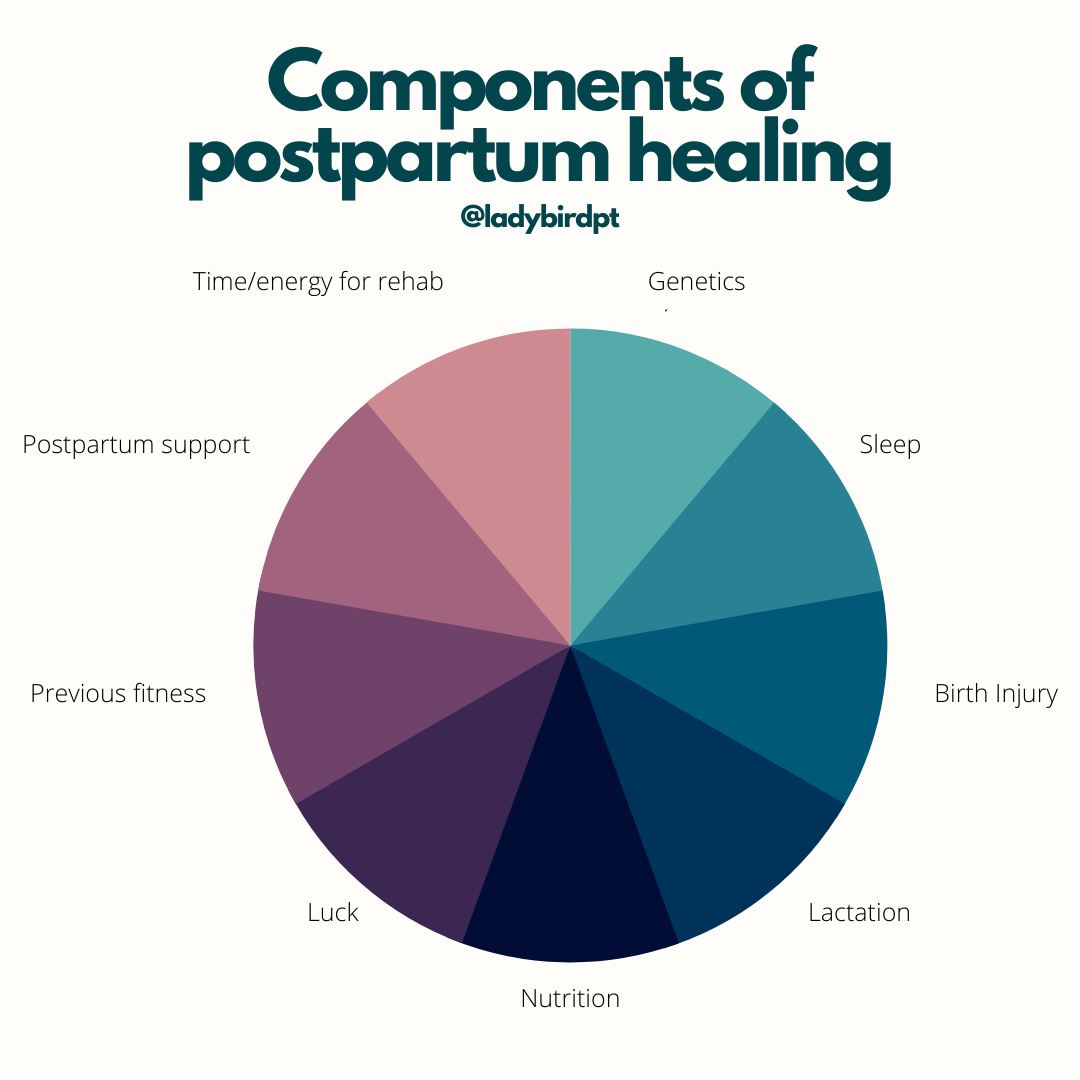A realistic timeframe for recovering postpartum is 6-18 months, not 6 weeks.
A realistic timeframe for recovering postpartum is 6-18 months, not 6 weeks. People are often "cleared" by their OB/midwife for sex and exercise at 6 weeks postpartum. As a result, this has become the unofficial expectation for postpartum recovery, leaving many postpartum people confused, angry and so disappointed when they’re not back to feeling themselves at the 6 week mark.
Normalizing realistic postpartum expectations is one major step in the direction of limiting postpartum suffering. A recent article by Johnson et.al. found a strong link between education and expectation setting during pregnancy and postpartum suffering. The study reported that ”[Individuals] who reported high discrepancy between expectations and experience had the strongest associations between pelvic floor and psychological symptoms.”
To summarize: setting false expectations for pregnant people leads to more suffering postpartum.
So let’s break down some realistic postpartum expectations. The 6 week postpartum check up is when your OB/midwife will check that your uterus has returned to pre-pregnancy size & that any tear or scar is healing well. But those are just TWO of the many factors that mark recovery. There are a number of additional factors to consider for postpartum recovery, all of which require more than 6 weeks to return to baseline.
Some of the most impactful components of postpartum healing include:
Strength & tone of your pelvic floor & abdominals
Hormones & lactation
Pregnancy & birth injuries
Sleep
Previous levels of fitness
Genetics
+ some honorable mentions including luck, nutrition & postpartum support
This laundry list of contributing factors are the primary reason why it’s not uncommon to take up to 2 years to feel fully recovered from birth. In fact, when we asked our Instagram followers how long it took for them to feel recovered after childbirth (recovered was not clearly defined when this question was posed), the majority of answers were well over 6 months with many reporting 1-2 years. Click here to read through the responses.
But let’s expand on some of the factors listed above, as well as their associated timelines.
1. Strength & tone of your pelvic floor & abdominals
Pregnancy creates 9 months of stress on your pelvic floor and abdominal muscles and culminates in birth, a traumatic (physically, sometimes emotionally) event. Regaining that strength takes far more than 6 weeks. In fact, what we know of muscular hypertrophy is that it takes a minimum of 12 weeks to truly build strength. While we can make gains faster than that particularly in the realm of motor control, or our ability to use our muscles, regaining strength takes time.
Additionally, strengthening takes concerted effort over time. As any new parent knows, devoting consistent effort to your fitness while caring for a newborn is incredibly difficult. Your strength will return when you have the time to regain it.
2. Hormones & Lactation
For as long as you're lactating, your pelvic floor has decreased estrogen, a hormone key to pelvic health. These hormone levels don't return to pre-pregnancy levels until you are no longer lactating, which for many folks is 1-2 years. Ever wonder why vaginal dryness is so common while your lactating? This is why.
It’s not uncommon for folks to experience a reduction in common postpartum symptoms (leakage, prolapse symptoms, pain with sex) once they stop lactating. In the meantime, using a topical estrogen cream prescribed by your medical provider can be a helpful replacement for the estrogen your body is lacking during your bodyfeeding years.
3. Pregnancy & Birth Injuries
Common postpartum symptoms can include incontinence, prolapse, pelvic pain, pain with sex, diastasis recti. Other common birth injuries include perineal, vulvar and vaginal tearing, with more serious birth injuries including coccyx and pelvic bone fractures. These symptoms and injuries take time, consistent work & oftentimes personalized program to heal. Many of these symptoms are a result of soft tissue injuries which can heal notoriously slowly, not to mention healing is slowed during periods of poor sleep, poor nutrition and high stress.
You can absolutely heal from your birth injury, but that doesn’t mean healing is easy nor does it mean time is enough. If you’re struggling with any of those previously listed symptoms since giving birth, know that it’s never too late to begin postpartum rehab. Whether you’re 2 weeks, 2 months or 2 years postpartum, whenever you have the time to focus on your recovery, your body can heal.
4. Sleep
Sleep is integral to healing and recovery. When you're not sleeping, your body will heal more slowly and have less capacity for stress of any kind, including exercise. If you’re interested in learning more about how sleep impacts our health, check out Why We Sleep. Why We Sleep is an amazing book by Matthew Walker that dives deep into the power of sleep and the impact a lack of sleep has on our health.
5. Previous Level of Fitness
The stronger you go in to a sports injury, the faster you heal. The stronger you go into surgery, the faster your heal. The stronger you go into pregnancy and into birth, the faster you heal. A high level of fitness does not guarantee a quick and easy postpartum recovery, however no matter what happens during pregnancy and birth, going in strong will serve you in your healing postpartum.
6. Genetics
Genetics is incredibly undervalued when it comes to pregnancy, birth and postpartum recovery. Have you ever wondered why your recovery was so incredibly different than your friends recovery, despite doing all the same things? Genetics. We can’t control pregnancy and birth. We can’t control our genetics, either. And while there are so many things we can do to help reduce the risk of certain birth and postpartum complications and symptoms, in the end, we cannot control this experience.
The reality is some people will feel great at 6 weeks postpartum, and many will not. Setting realistic expectations for yourself is such an important part of a healthy recovery. Normalize a 6-18 month postpartum recovery timeline.
This post was written by Dr. Rebecca Maidansky, PT, DPT, owner and founder of Lady Bird Physical Therapy. Rebecca is a pelvic floor physical therapist in Austin, TX and founded Lady Bird Physical Therapy in 2019. She is the creator of Birth Preparation and Postpartum Planning, Baby Steps Fitness and the head writer and editor of The Pelvic Press.
Rebecca is a passionate writer and vocal advocate for pelvic health and the importance of improving access to perinatal care. She believes strongly that many common pregnancy pains and postpartum symptoms can be eased or even prevented with basic education and care.
She created this blog to help all birthing people manage common pregnancy pains, prepare for birth and recover postpartum.


